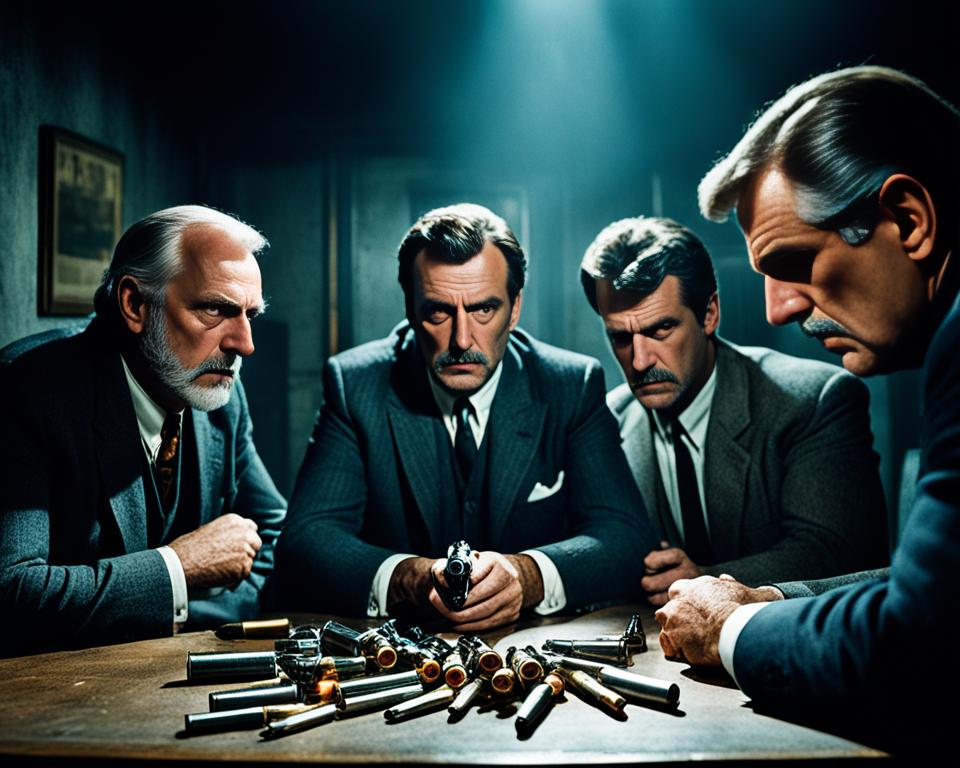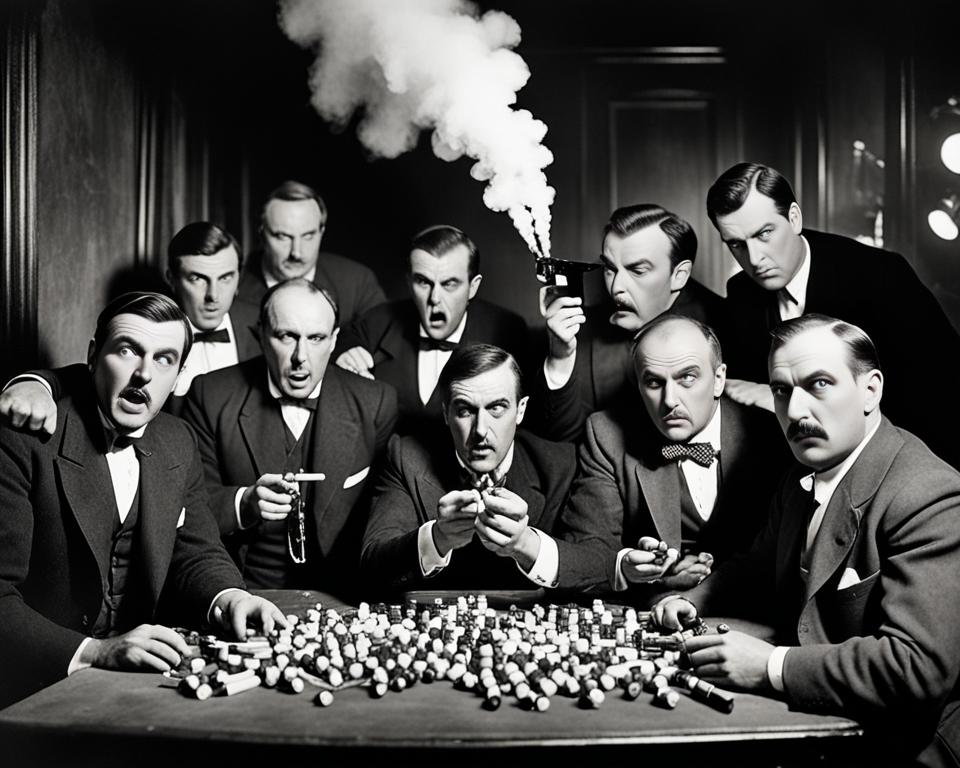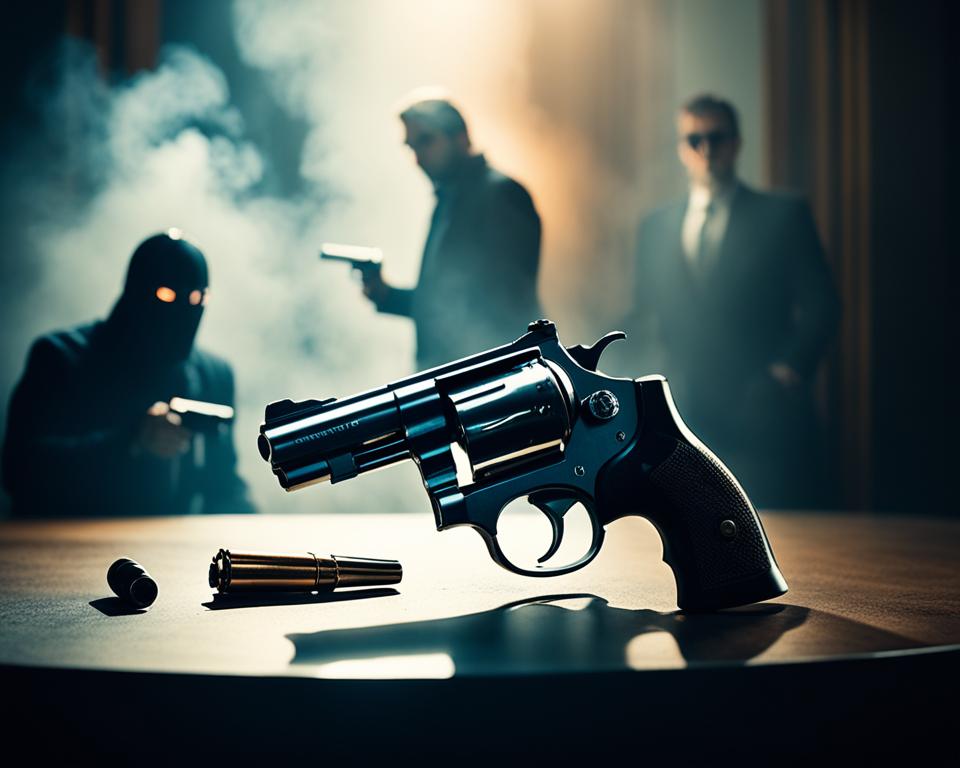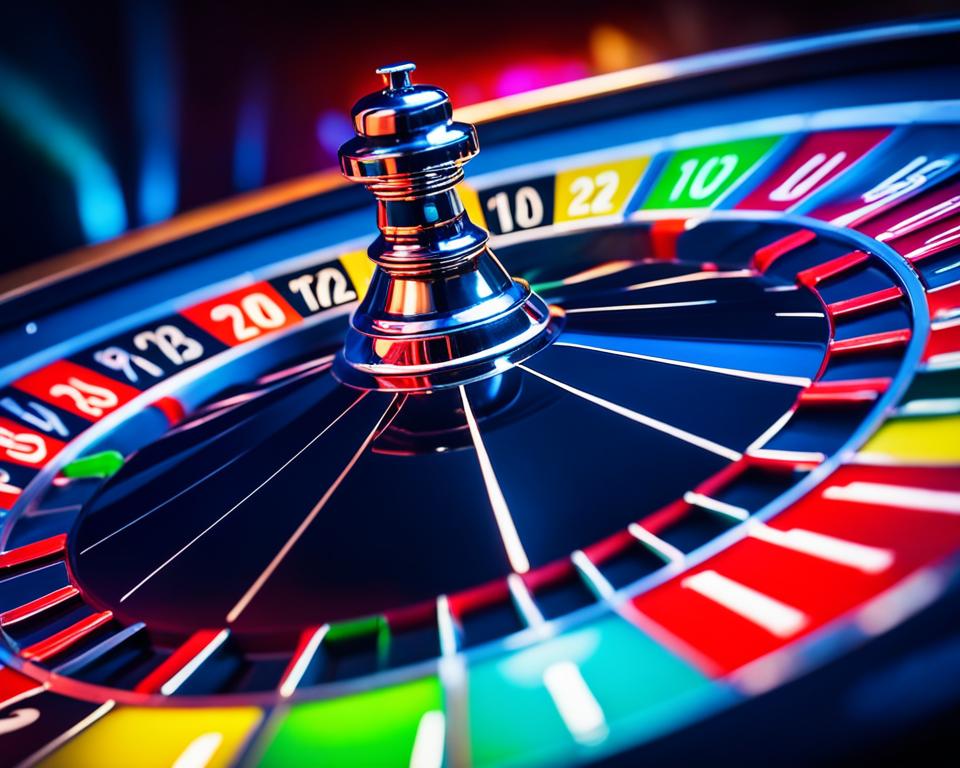The history of Russian roulette starts in the 19th century with a revolver and one bullet. It remains a mystery who first played this dangerous game. Some think it began in military circles, others suspect cultural reasons. Yet, we still don’t know for sure who thought it up. The name “Russian roulette” comes with deep meanings and unknown origins. This article dives into the early stories, the possible creators, and the lasting impact of this deadly pastime.
Introduction to Russian Roulette
Russian roulette is a deadly game of chance. Players load a round into a revolver, spin the cylinder, and aim at their head. Then, they pull the trigger. The origins of this game are uncertain but date back to the 19th century. Historical records and cultural hints show its dangerous past.
Defining the Deadly Game
Russian roulette is about pure chance and risk. Players load a single bullet, then spin the revolver. They point it at their head and pull the trigger. This unpredictability leads to a possibility of a lethal outcome. It’s truly dangerous and deadly pastime.
A Brief Overview of the Origins
The origins of Russian roulette are unclear. It has ties to the 19th century and maybe to military settings. Some believe it started in Eastern Europe or Russia. Knowing the deadly game history and lethal game origins can help find its designer or founder.

Early Accounts of Russian Roulette
The true creator of Russian roulette is still a mystery. Yet, the game’s possible beginnings give us hints. It is said that in the 19th century, the game might have started in the military. This was possibly among Russian or Eastern European soldiers. Though these stories are not confirmed, they tell us of the game’s early days and how it was rooted in danger. These tales can guide us to who might have come up with this risky pastime.
Rumors from the 19th Century
In the 1800s, whispers of Russian roulette circulated in military circles, possibly among Russian troops. These stories suggest that the dangerous game began in atmospheric military settings. Here, people were daring and not afraid of something deadly.
Possible Military Origins
Scholars think Russian roulette comes from the military. They believe it was possibly created by soldiers or officers craving more risk and danger. But, there is no hard evidence for these claims. This mystery continues to swirl , enhancing the intrigue around the game’s unknown creator.

Exploring the Name “Russian Roulette”
Experts are still debating the origin of “Russian roulette.” Some believe its ties to Russia or Eastern Europe give it its name. The word “roulette” hints at gambling or chance, adding to its mystery.
Theories on the Nomenclature
Most think “Russian roulette” links to its use by soldiers in Russia or Eastern Europe. The term likely highlights its dangers from these places. It reflects the high-risk nature of the life-or-death game.
Cultural Associations and Connotations
The name “Russian roulette” now stands for daring and sometimes reckless actions. Its risky nature and potential outcome of death make it a powerful symbol. It deeply influences how we think about risk, thrill, and danger related to who invented russian roulette, russian roulette origin, russian roulette history, deadly game history, lethal game origins, risky game inventor, dangerous game creator, death game originator, russian roulette designer, and russian roulette founder.
Earliest Recorded Instances
The origins of Russian roulette, a deadly game with lethal game origins, can be tracked back. This is to various literary references and descriptions from the late 19th and early 20th centuries.
These historical accounts don’t pinpoint a inventor or originator of the dangerous game. But they do show us how this risky game was seen and described at that time.
One early mention of Russian roulette was in the 1889 story “The Suicide Club” by Robert Louis Stevenson. He talks about a deadly game with a revolver and a deadly outcome chance, similar to Russian roulette. In later works, like those of Ernest Hemingway, this not only continued but detailed the cultural associations and thrill-seeking aspects of this dangerous game.
These literary depictions have helped us to better understand the historical side of Russian roulette. They also show its long-lasting effects on popular culture and the public imagination. Even though we still don’t know for sure who came up with it, these writings give us an important view on the origins and evolution of this deadly game.
who invented russian roulette
The inventor or originator of Russian roulette is still unknown. Many have been linked to this dangerous game, but no one has been confirmed as the inventor. Theories and claims about who started it vary. Suggestions include military personnel and thrill-seekers. Yet, the real creator of Russian roulette eludes identification. The mystery around its beginnings makes this lethal game even more intriguing.
Potential Inventors and Originators
The true inventor of Russian roulette is unknown. Many have tried to figure it out over the years. They’ve pointed to military officers, adventurous people, and even fictional characters. Yet, without solid proof, many of these stories have been called into question.
Examining Historical Claims
Some say Russian roulette likely started in Russian or Eastern European military settings. They think it could be from these areas because of their risk-filled nature. Russian army officers are sometimes named as those who might have come up with the game. But, with no real evidence and stories that get bigger with time, proving these claims is tough.
Debunking Myths and Urban Legends
Besides these ideas, some have made up stories saying the game was started by fictional characters or unknown people. These tales, though interesting, just don’t hold up without proof. It’s important to sort through what’s real and what’s not to understand who may have actually created this dangerous game.
Russian Roulette in Popular Culture
The true inventor of Russian roulette is a mystery. Yet, it’s made a big mark on popular culture. It’s shown up in many movies, TV shows, and more. These portrayals often focus on the danger and make it seem intense. The concept of “Russian roulette” is also used to show risky or self-destructive actions. This cultural presence has made Russian roulette a well-known and impactful symbol.
Depictions in Film and Television
Russian roulette has always intrigued filmmakers and show creators. It has been a part of movies from old classics like “The Deer Hunter” to today’s thrillers. In these stories, the game’s danger and life-changing stakes are highlighted. This has helped shape the way people view Russian roulette, making it seem risky and exciting.
Metaphorical and Symbolic Uses
The term “Russian roulette” has grown to symbolize risky situations beyond its original meaning. It portrays situations where the danger is real and outcomes are unknown. This use has turned Russian roulette into a symbol for risks and adventure in society.
Psychological and Sociological Factors
Russian roulette stays popular because of how it fits our minds and society. Experts study why people are drawn to the game’s risks and thrills. They look at the need for excitement and the choices people make in risky situations.
Risk-Taking Behavior and Thrill-Seeking
Scientists focus on the inner workings of why Russian roulette remains intriguing. They find that our urge for excitement and the game’s deadly nature attract some. For many, it’s all about the rush of adrenaline it provides.
Cultural and Socioeconomic Influences
Cultural beliefs and socioeconomic status also play a big role. Things like ideas about masculinity, how we see risks, and pressure from society or money can draw people in. These factors help us understand why the game captivates so many over time.
Legal and Ethical Considerations
Russian roulette is a deadly game, sparking many
legal and ethical debates.
It is banned in several places, facing strict laws. Those caught playing or promoting it can be in big trouble.
“The playing of Russian roulette is a criminal offense and can result in heavy fines or even imprisonment in most countries.”
Laws and Regulations Surrounding the Game
Across the globe, governments are clamping down on Russian roulette. Playing or setting up the game is illegal in numerous places. The goal is to end this risky tradition and safeguard people from its tragic outcomes.
Moral and Ethical Debates
The game has sparked deep moral and ethical conversations. Ethicists and philosophers have studied its broad effects. They worry it could hurt our minds and cultures, promoting dangerous behavior.
Modern-Day Perspectives and Variations
While the original form of
Russian roulette
is very dangerous and wrong, new ways to play have come about. These days, Russian roulette isn’t just played with a real gun. People have made safe and fun versions to study the game’s effects on our minds and society. This is without the scary chance of dying.
But still, the risks and ethical issues with Russian roulette are talked about a lot. People are trying to understand why this game keeps grabbing our attention. Its origins, history, and legacy interest many. This helps us learn more about why we enjoy taking risks and seeking thrills.
“The modern interpretations of Russian roulette may offer a safer way to explore the game’s psychological and societal implications, but the inherent dangers and ethical concerns remain a topic of ongoing debate.”
The exact beginning of the game is still unknown. But, we do know a lot about how it’s evolved and what it means to us today. Finding a balance between the game’s danger and its mystery is hard but important. This is especially true for those considering its complicated history.
The Lasting Legacy of Russian Roulette
Even though we don’t know one specific person who started Russian roulette, this game has deeply influenced society and popular culture. It is famous for challenging views on risk-taking, thrill-seeking, and self-destructive behavior.
Impact on Society and Popular Culture
The phrase “Russian roulette” now symbolizes dangerous situations. It has made its way into movies, TV, and other media. These stories make the game’s risks and results more dramatic, contributing to its lasting fame.
Symbolism and Metaphor in Modern Times
Though the game’s exact beginnings are unknown, the lessons of Russian roulette survive. It acts as a warning against seeking out danger. This story is far more than just a game; it touches on our relationship with risk and the darker sides of human nature.
Conclusion
Russian roulette’s beginnings are unclear, with no identified person as its creator. Despite this, the game’s history and cultural impact are well known. It shows how people are drawn to risk and the unknown.
The game continues to grab our attention and make us think. Even though we don’t know its creator, it warns us about the dangers of risk and self-destruction. Its story teaches us a lot about ourselves.
As a result, the mystery behind Russian roulette makes it even more fascinating. Often, it forces us to think deeply about its implications. The search for the game’s creator will likely go on without end, showing how powerful the unknown can be.

